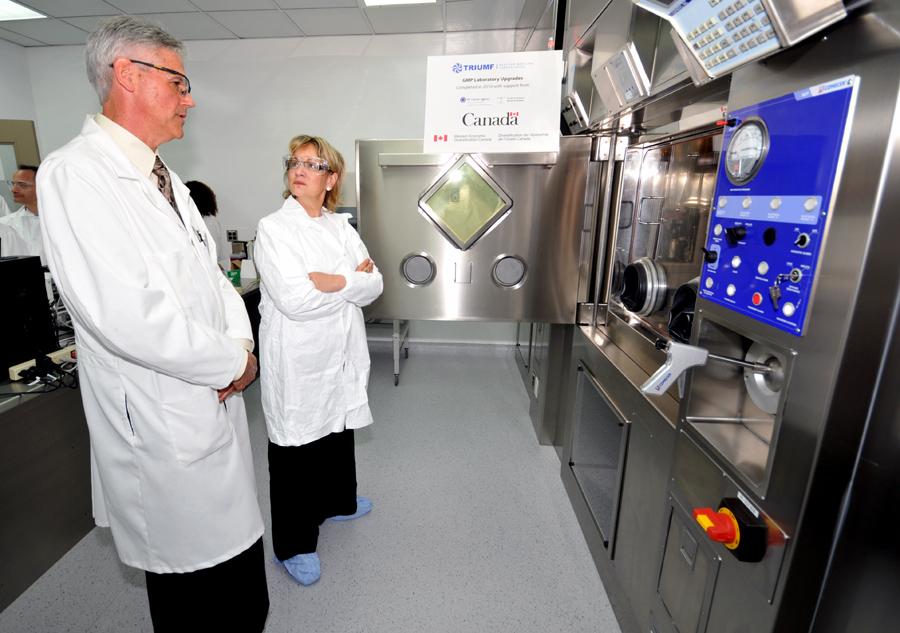A federal investment of over $911,000 to support innovative medical and pharmaceutical research at TRIUMF through the Western Diversification Program was announced by the Honourable Lynne Yelich, Minister of State for Western Economic Diversification Canada.
Our Government believes that science, technology and innovation are vital to stimulating productivity, competitiveness and growth
said Minister Yelich. Research funding is an investment in scientific discovery, in new ideas and products, and in job creation through tough economic conditions.
Minister Yelich talks with Dr. Michael Adam in the GMP "Hot-Cell" lab.
Today's funding will support TRIUMF in upgrading essential infrastructure and in the acquisition of equipment which creates Positron Emission Radiopharmaceuticals (PERs). These radiopharmaceuticals are essential for Positron Emission Tomography (PET) scanning; an important medical diagnostic procedure used for the detection of cancer. The upgraded equipment will ensure the facility has continued compliance with industry standards. Today’s project contributes to the infrastructure that is essential to improving medical and pharmaceutical research in British Columbia.
The promise of nuclear medicine is its potential to understand the individual diagnosis and treatment plan for each person in real time and non-invasively
” said Dr. Thomas J. Ruth, senior scientist jointly at TRIUMF and the BC Cancer Agency. Today’s investment will not only move forward our research programs with the Pacific Parkinson’s Research Centre and the BC Cancer Agency in understanding movement disorders and cancer, but it will also enhance our efforts bring these results into the clinic following the strictest quality controls for use with humans.
Positron Emitting Radiopharmaceuticals (PERs) are drugs that emit radiation and are essential for Positron Emission Tomography (PET). PERs are typically injected into a patient and localized in different areas of the body. The radiation emitted from the PER is detected using a PET scanner and thus produce an image (i.e. PET scan) that is observed by a physician to diagnose or determine the state of a disease.
Positron Emission Tomography (PET) imaging is the core of the TRIUMF nuclear medicine program. PET is a safe and effective scanning technique in medical research that detects the presence and extent of cancer, cardiovascular disease, neurological conditions and other physiological problems.
While other imaging techniques such as X-rays or CT scans provide anatomical information on how organs or tissues look, a PET scan shows what the cells in those organs or tissues are doing. This functional information is then used for diagnosis, evaluation and treatment of disease. PET is the most advanced medical diagnostic imaging technology available today for the early and accurate detection of cancer and has now become the “gold standard” in the industry.
Good Manufacturing Practices (GMP), part of Food and Drug Regulation, is a guidance document developed by Health Canada. It applies to pharmaceutical, radiopharmaceutical, biological, and veterinary drugs. These guidelines are designed to facilitate compliance by the regulated industry and to enhance consistency in the application of the regulatory requirements.
Western Economic Diversification Canada works with provinces, industry associations and communities to promote the development and diversification of the western economy, coordinates federal economic activities in the West and represents the interests of western Canadians in national decision-making.
--based on a WD news release

